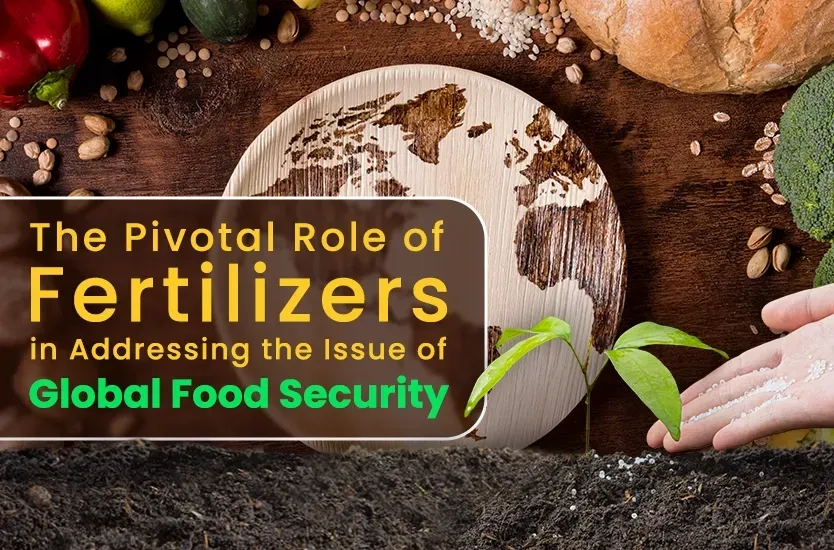- Get link
- X
- Other Apps
- Get link
- X
- Other Apps
The world's population is projected to exceed 10 billion by the end of this century, according to estimates by the United Nations. This growth poses significant challenges, especially in ensuring an adequate food supply for everyone. Urbanization further complicates matters by reducing available farmlands and increasing the distance between food production and consumption centers, leading to logistical challenges and increased food wastage.
Moreover, climate instability is affecting agricultural productivity worldwide, adding another layer of complexity to food security issues. Recognizing these challenges, global organizations emphasize the critical importance of addressing food security to sustain stable and prosperous societies. The United Nations has identified Zero Hunger as one of its Sustainable Development Goals (SDGs), underscoring the gravity of the issue.
Pressing Issues Impacting Food Security
Several factors contribute to the complexity of ensuring global food security:
-
Climate Change: Extreme weather events disrupt agricultural patterns and decrease crop yields.
-
Water Scarcity: Shortages of water for irrigation affect crop growth and productivity.
-
Soil Degradation: Nutrient loss and soil erosion reduce arable land and fertility.
-
Conflict and Instability: Wars and conflicts disrupt food supply chains and agricultural activities.
-
Cost of Fertilizers: Rising fertilizer prices impact farmers' ability to maintain yields.
-
Population Growth: The expanding population demands more food from limited resources.
Addressing these challenges requires innovative strategies and sustainable solutions to ensure a stable food supply for future generations.
The Vital Role of Fertilizers in Enhancing Food Production
Fertilizers play a crucial role in boosting agricultural productivity and addressing food security concerns. They provide essential nutrients that promote plant growth, health, and yields. Responsible fertilizer use not only enhances crop performance but also minimizes environmental impact.
Traditional and Modern Fertilization Practices
While historical methods like composting and animal manure remain valuable, modern fertilizers offer tailored solutions to optimize crop nutrition. The International Fertilizer Association estimates that mineral fertilizers contribute significantly to global food production.
Advancements in Fertilizer Technology
Recent innovations in the fertilizer industry have revolutionized agricultural practices. Controlled-release fertilizers and precision farming techniques enable efficient nutrient management, improving crop yields while reducing environmental impact.
Precision Agriculture : Revolutionizing Farming Practices
The advent of precision agriculture, driven by advancements in technology like Artificial Intelligence (AI) and the Internet of Things (IoT), is transforming farming into a data-driven industry. Technologies such as drones, smart sensors, and automated irrigation systems optimize resource utilization and enhance crop management.
Benefits of Precision Farming
Precision farming not only boosts productivity but also reduces resource wastage and promotes long-term soil health. By leveraging data analytics and real-time monitoring, farmers can make informed decisions to optimize crop production. Precision Grow is a pioneer in crop health monitoring that provide real-time data for precision farming.
The Future of Agriculture : Balancing Innovation and Sustainability
As global food demand continues to rise, agriculture must embrace technological innovations while prioritizing sustainability. Agronomical research plays a pivotal role in developing resilient crops, preserving soil fertility, and promoting efficient resource management.
Collaborative Efforts for Food Security
Achieving food security requires collaborative efforts among governments, international organizations, researchers, and industry stakeholders. By investing in sustainable agriculture practices and supporting technological advancements, we can ensure a food-secure future for generations to come.
In conclusion, addressing the challenges of global food security demands a multifaceted approach that integrates innovative technologies with sustainable agricultural practices. Fertilizers, particularly those tailored for precision farming, are instrumental in enhancing food production while mitigating environmental impact.
- Get link
- X
- Other Apps
Comments

It's amazing how these techniques are transforming agriculture, aiding precision farming and resource management.
ReplyDeleteThis blog sheds light on an important aspect of food security—fertilizers.
ReplyDeleteA comprehensive analysis of how fertilizers contribute to overcoming global food insecurity. T
ReplyDeleteThoughtfully written! Fertilizers are vital for enhancing crop productivity and ensuring food availability.
ReplyDeleteInsightful discussion on how fertilizers contribute to global food security. Enjoyed reading this detailed examination of such a critical topic
ReplyDeleteA compelling argument for the strategic use of fertilizers in tackling food security challenges. Well-researched and articulate
ReplyDeleteThis article highlights their significance brilliantly
ReplyDelete